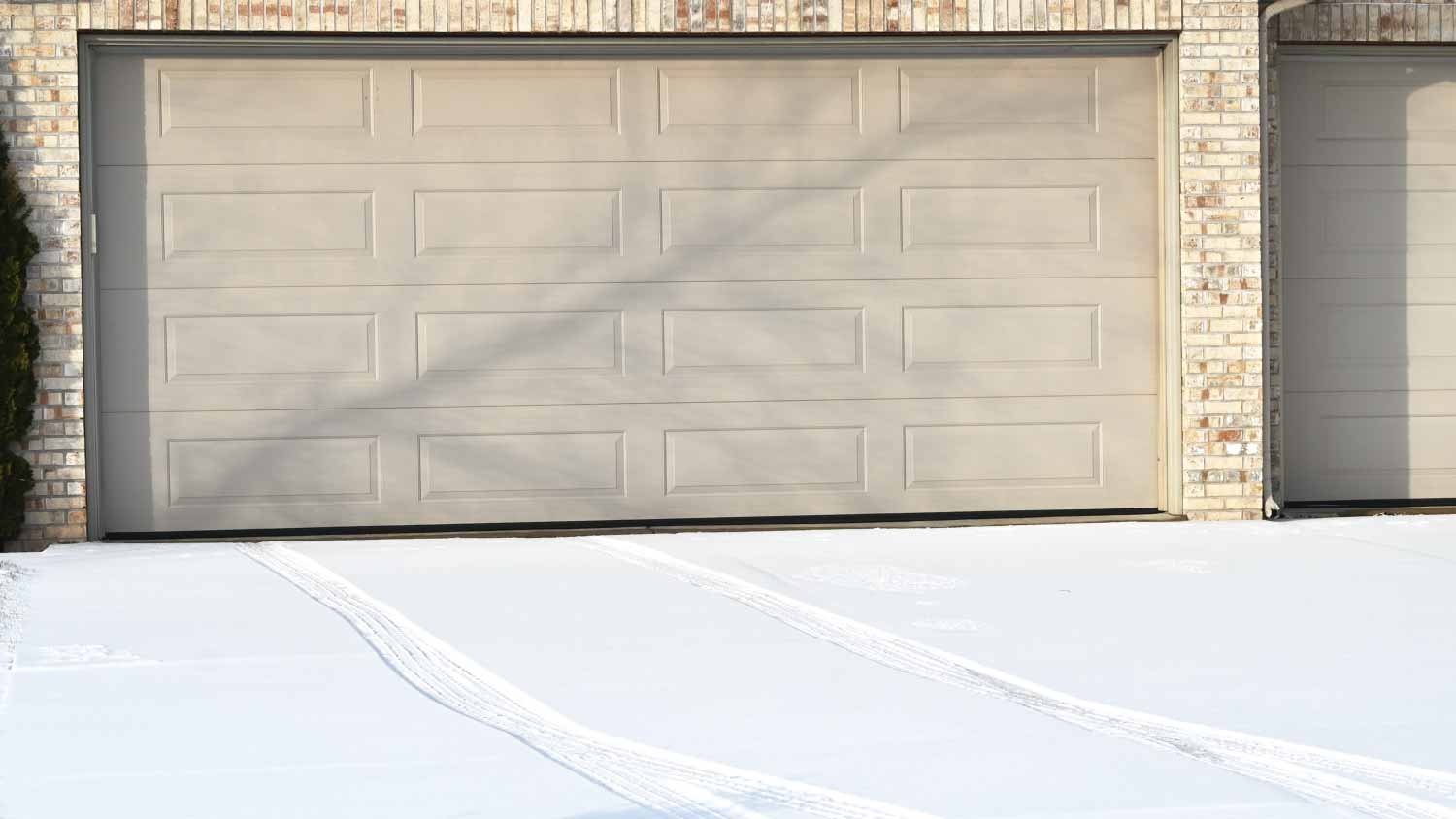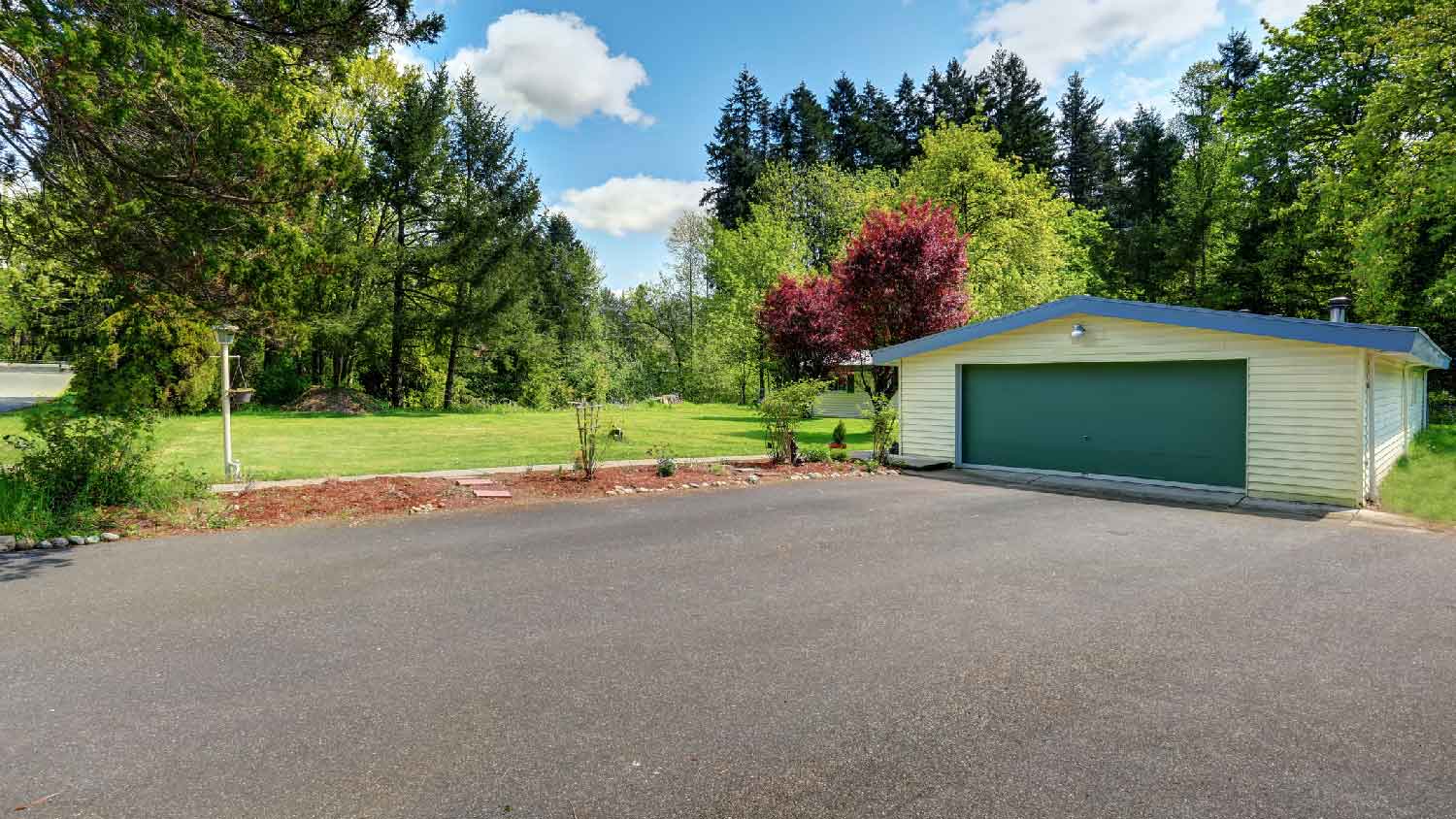
Use our guide to calculate the cost to seal an asphalt driveway. Prices vary based on the type of sealant and the size of the driveway.
Find out what's causing those unsightly driveway cracks so you can fix them the right way


It's easy to brush off a small crack in your driveway as a sign of its age, but that might not be the case. In fact, many things could cause cracks in a driveway, such as settling, improper installation, and more.
These cracks can lead to expensive repair bills if not taken care of promptly. For example, asphalt driveway repair costs up to $3,600, while a simple patch costs only $20 to $40. Let’s look at the causes so you can decide the best way to fix and fill driveway cracks.
A cracked driveway is often the result of faulty foundation installation. The base of your driveway should consist of tightly packed crushed stone or gravel, followed by an aggregate base. Then, the driveway surface is laid on top. If the base or foundation is sub-par (for example, it’s not packed tightly enough or uses sand or soil substrates that shift and erode), the driveway quickly cracks.
Settling cracks occur when there's a space beneath the driveway. Over time, with the weight of the driveway and vehicles passing, the ground shifts to fill the void, and the driveway cracks as it settles onto the newly adjusted ground.
Settling isn't necessarily due to poor installation. Instead, it can be because you or your neighbor had a tree removed, and the roots beneath your driveway decomposed. Or, at some point, a utility company did some work on the spot where your driveway is now, but they failed to compact the soil properly when they finished.
Oversized or extra-heavy vehicles can easily crack your driveway, as concrete and asphalt have weight limits. Additionally, even if the driveway surface can withstand the added weight, if the ground beneath cannot, it will shift, resulting in a void and a stress crack in the driveway surface. This occurrence is particularly true after heavy rain when the ground beneath the driveway is softer.
As tree roots grow and spread beneath your driveway, they apply pressure from below. Eventually, to relieve the stress, the driveway surface cracks as the foundation and base layers push upward.
Dings and scrapes from sharp or edged items like snowblower blades, poorly handled snow shovels, or studded tires can crack or tear chunks from a driveway's surface. It's essential to fix accidental cracks or chips like these ASAP. If you don’t, water, salt, and snowmelt will work their way in and cause more cracking. If you don't have the time or skills, hire a local driveway repair service to take care of it for you.

Concrete and asphalt can both crack with repeated freeze and thaw cycles. As snow and ice melt or as heavy rain falls, water seeps into your driveway. If it freezes, it expands, putting concrete and asphalt under a lot of stress.
If you apply rock salt to your driveway during the winter, you're actually exacerbating the problem. When you use salt, it penetrates the driveway and attracts additional H2O. Luckily, there are plenty of ice melt alternatives that help preserve your driveway.
Concrete is prone to heat expansion, which can cause cracking. As it heats up, concrete expands and pushes outwards. If it pushes against another inflexible substance, like a brick wall, it will break to relieve the pressure build-up.
Plastic shrinkage usually occurs when there’s too much water in the concrete mix. The concrete cracks as it dries because the water evaporates, leaving spaces that weaken the structural integrity. Your concrete pro must create the optimal blend to prevent concrete cracks like this.
Crumbling and cracking around the edges of your driveway indicate that the asphalt is too thin in those places. It's common for the asphalt to spread beyond the aggregate base during laying, creating a narrow strip of asphalt with no solid foundation. While these edge cracks aren't dangerous, they are unsightly. One way to remedy this is to hire a driveway specialist to remove the cracked edges, recompact the foundation, lay a brick edging, then lay new asphalt between the existing driveway and the brick.
Spiderweb or alligator cracks in an asphalt driveway indicate that the contractor used a low-quality asphalt mix or that the previous homeowners had the driveway repeatedly coated with sealers. This is because the cost to seal a driveway is significantly less than fixing the underlying issue and bearing the cost of replacing a driveway. The only way to fix this issue is to remove the asphalt layer, recompact the base, and lay new asphalt.

When pouring a concrete driveway, minor cracks are common as part of the drying and curing process. To prevent larger cracks in concrete though, follow the below steps:
Get the water ratio right. If you’re pouring concrete yourself, be extra careful of the water to concrete ratio. Even a slightly wetter mix will lead to weaker concrete.
Allow to cure. Concrete takes about a month to fully cure, but is most sensitive in the first week. Keep the concrete moist, and avoid parking and driving your car on your driveway for a few weeks.
Place control joints. Joints can help redirect a crack to spots that you can more easily seal.
Tamp down the driveway base. Before laying any driveway, make sure the surface below is tamped down to an even layer.
Install during warm weather. Driveways cure best when the weather is on the warmer side. Avoid temperatures below 35 degrees Fahrenheit.
Regular seal driveways. Be sure to seal your driveway as the last step of installation and get it resealed every five to 10 years. The cost to seal a driveway is around $500.
The best way to prevent driveway cracks is to hire a professional to do the installation. On average, the cost of a concrete driveway is $1,900, but it ultimately depends on your driveway size. Concrete is extra sensitive to weather, overmixing, undermixing, and its surrounding environment. Having a professional install a new driveway can be expensive, but if you don’t have prior experience working with concrete, you’ll likely spend more time and money regularly fixing and filling cracks.
Don’t go with the first driveway professional you find. Instead, try “shopping around” for a company that gives you a good balance of experience, knowledge, and of course, affordability. Go into the meeting—whether it's over the phone or in person—with some questions ready.
To hire a concrete driveway contractor, consider asking:
How many years of experience do you have?
Are you licensed?
Do you have insurance coverage, and does it cover accident damages?
Do you offer warranties?
Can I see a portfolio of your work?
Do you have references I can contact?
What are the steps to complete the installation?
Is removal of the existing driveway included?
How long will the project take?
How long should the driveway last?
How long do I have to wait before parking on the new driveway?
Do you provide cleanup services at the end?
How much will the project cost?
While a phone conversation can be a good first step to vet contractors, make sure you meet them in person and at your home before they give you a quote and before you decide to move forward.
From average costs to expert advice, get all the answers you need to get your job done.

Use our guide to calculate the cost to seal an asphalt driveway. Prices vary based on the type of sealant and the size of the driveway.

Asphalt driveway repair costs account for everything from hairline cracks to complete overhauls. Learn what to expect from your asphalt repair bill.

The average cost to pave a driveway is $4,897, but prices vary by size and material. This guide breaks down common cost factors and helps you budget.

Learn how long it takes for asphalt to dry and cure, including the factors that affect the process and tips for ensuring the best results.

Get rid of weeds in your driveway forever with these step-by-step tips.

This article reveals the 6 most common types of asphalt cracks, their causes, and the best solutions to prevent further damage.